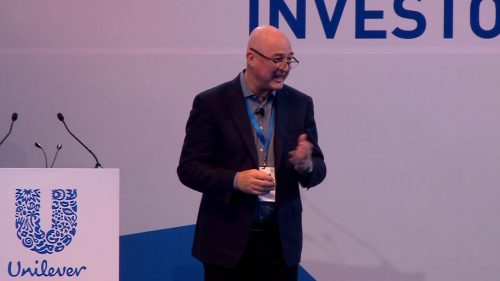Flat first quarter for Anglo-Dutch conglomerate Unilever

Anglo-Dutch household goods, personal care and foods conglomerate Unilever reported a flat first quarter, in a trading update to the stock market today.
It revealed its developed markets underlying sales growth was 2.8%, while emerging markets declined by 1.8%.
Turnover increased 0.2%, including a positive impact of 0.6% from acquisitions net of disposals and negative impact of 0.4% from currency.
The quarterly dividend has been maintained at £0.3614 per share.
Chief executive Alan Jope said: “COVID-19 is having an unprecedented impact on people and economies worldwide.
“Unilever has moved at speed to support our multiple stakeholders and maintain our operations through the crisis, and prepare for growth in a new normal.
“We have structured our immediate response into five areas: Supporting our people; protecting supply; serving demand; contributing to society; and maintaining our financial strength.
“Our people are our priority and we moved quickly to ensure the safety of our workforce as well as to protect incomes and jobs. We are now focused on redeploying people to those parts of the business that are seeing high demand.”
He added: “We have been able to maintain the supply of product and we are keeping our factories running through the many unpredictable challenges in local operating environments across our value chain.
“We are also opening up new capacity where it is most needed, such as in hand hygiene and food.
“Demand patterns are changing. As the crisis hits countries around the world, we see upswings in sales of hygiene and in-home food products, combined with some household stocking, and near cessation of out-of-home consumption, which is particularly affecting our food service and ice cream business.
“We are adapting to new demand patterns and are preparing for lasting changes in consumer behaviour, in each country, as we move out of the crisis and into recovery.”
He said the crisis highlights the importance of Unilever’s commitment to use its scale and brands as a force for good in society, throughout the pandemic and beyond.
“We are supporting communities through donations and partnerships, while our Lifebuoy and Domestos brands are leading the way on hygiene education programmes.
“We take these actions in the knowledge that we enter the crisis with a strong balance sheet and cash position.
“We are systematically reviewing all areas of cash generation and usage and re-evaluating all costs in the light of the current circumstances, so that we can continue to invest in our brands and reallocate funds towards the best opportunities.
“We will continue to adapt throughout this crisis.
“However, the unknown severity and duration of the pandemic, as well as the containment measures that may be adopted in each country, mean that we cannot reliably assess the impact across our markets and our business.
“We are, therefore, withdrawing our previous growth and margin outlook for 2020.
“Our portfolio, our financial stability and the quality of our leadership teams around the world mean that Unilever is well-positioned during this crisis and for the changing world that will come afterwards.
“The fundamental drivers of growth continue to be the key principles driving our execution as we remain focused on delivering superior long-term financial performance through our sustainable business model.”
Unilever has several operations in the North West, including a home and personal care manufacturing site at Port Sunlight, Wirral, a detergents plant in Warrington and a tea making site at Trafford Park in Greater Manchester.
The Warrington detergents plant is earmarked for closure later this year, with the loss of more than 100 jobs, following a strategic review.
Russ Mould, investment director at Manchester investment platform AJ Bell, said: “Shareholders will be pleased that Unilever is among the select few companies still prepared to pay a dividend during the coronavirus crisis.
“It’s all the more impressive that the Marmite maker is doling out the cash given that it failed to grow sales in the first quarter of 2020.
“It has been a game of two halves for the company this year.
“Sales of household cleaning products have shot up as people went to great lengths to ensure they could disinfect their homes during the pandemic.
“Sadly, this is the smallest part of its business; what really matters is how personal care, beauty, food and drink product sales have fared.
“To some extent its personal care products, like deodorants, are going to sell whatever is happening in the economy, hence why the business is seen as having defensive qualities.
“Sadly, ice cream sales have melted as distributors in tourism-led countries were reluctant to fill their freezers for fear that no-one would be visiting their shores in the near-term, as well as individuals in sunny climates being in lockdown and not out buying treats.
“Perhaps what really matters, in relative terms to how other companies are struggling temporarily, is the fact that Unilever is still managing to achieve significant sales, and ones that aren’t plummeting.
“Interestingly, Unilever has dropped its growth and margin outlook for 2020.
“The business had come under criticism late last year for falling short of its growth target. Coronavirus gives it the perfect excuse to re-set expectations and reduce pressure on the business to meet what might have been overly-aggressive goals.”




